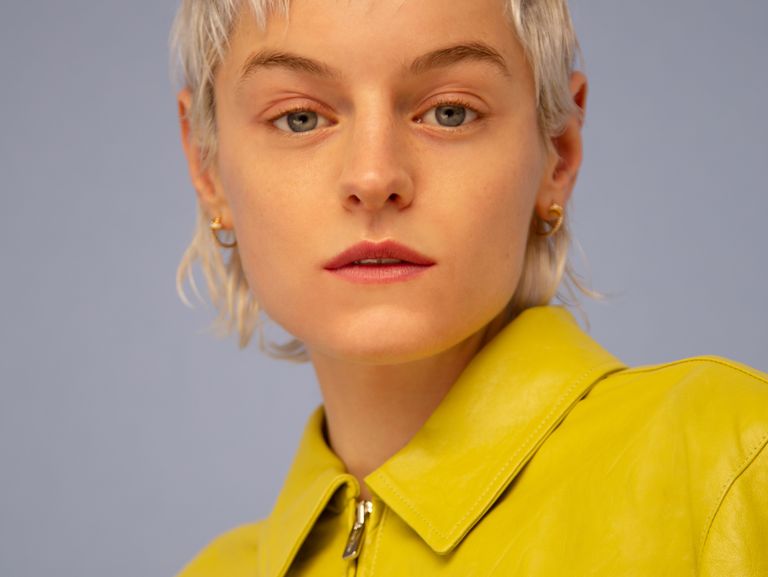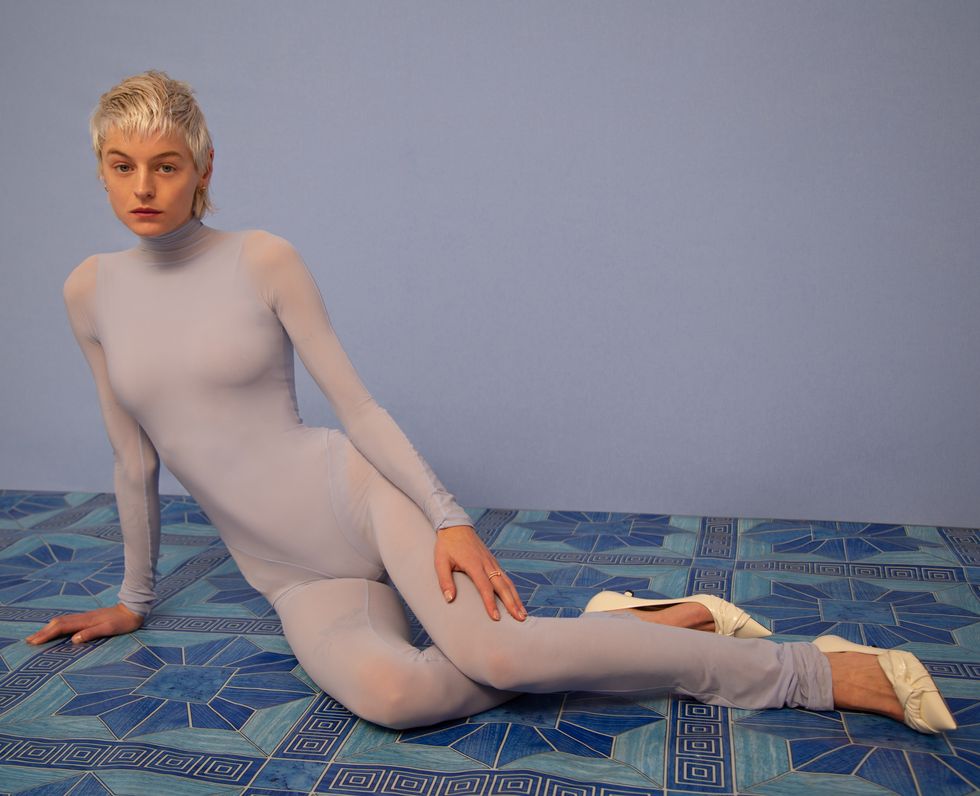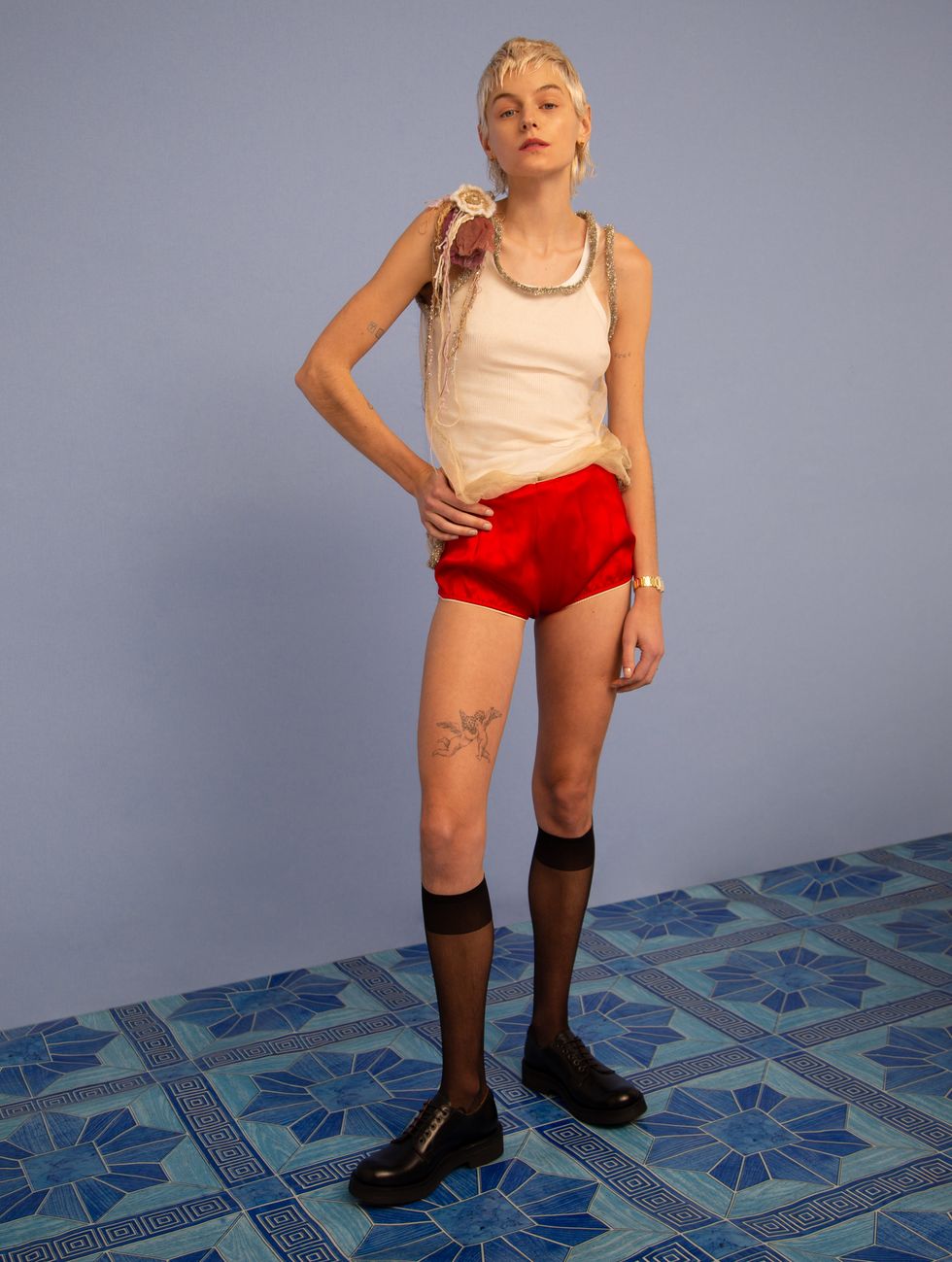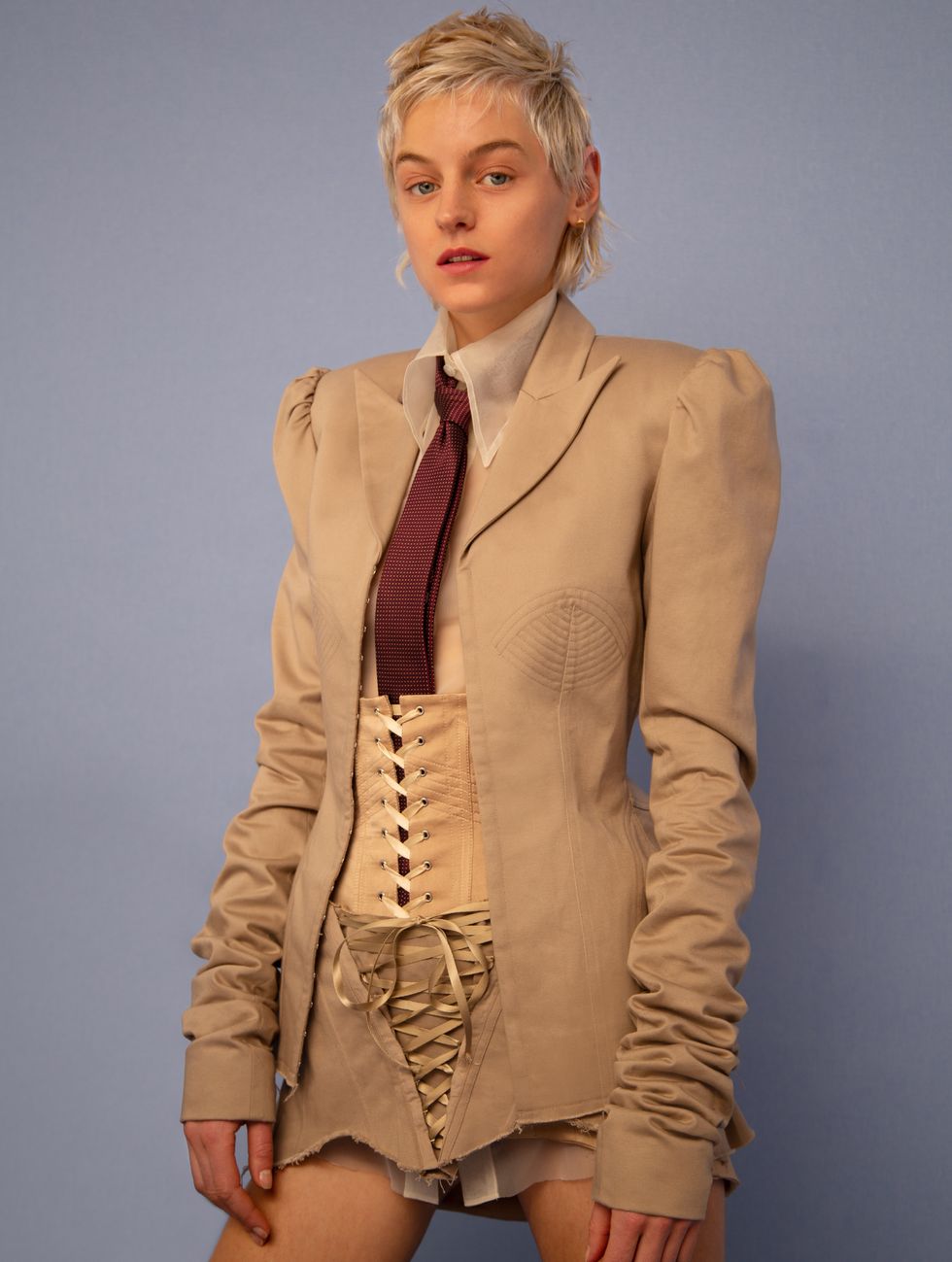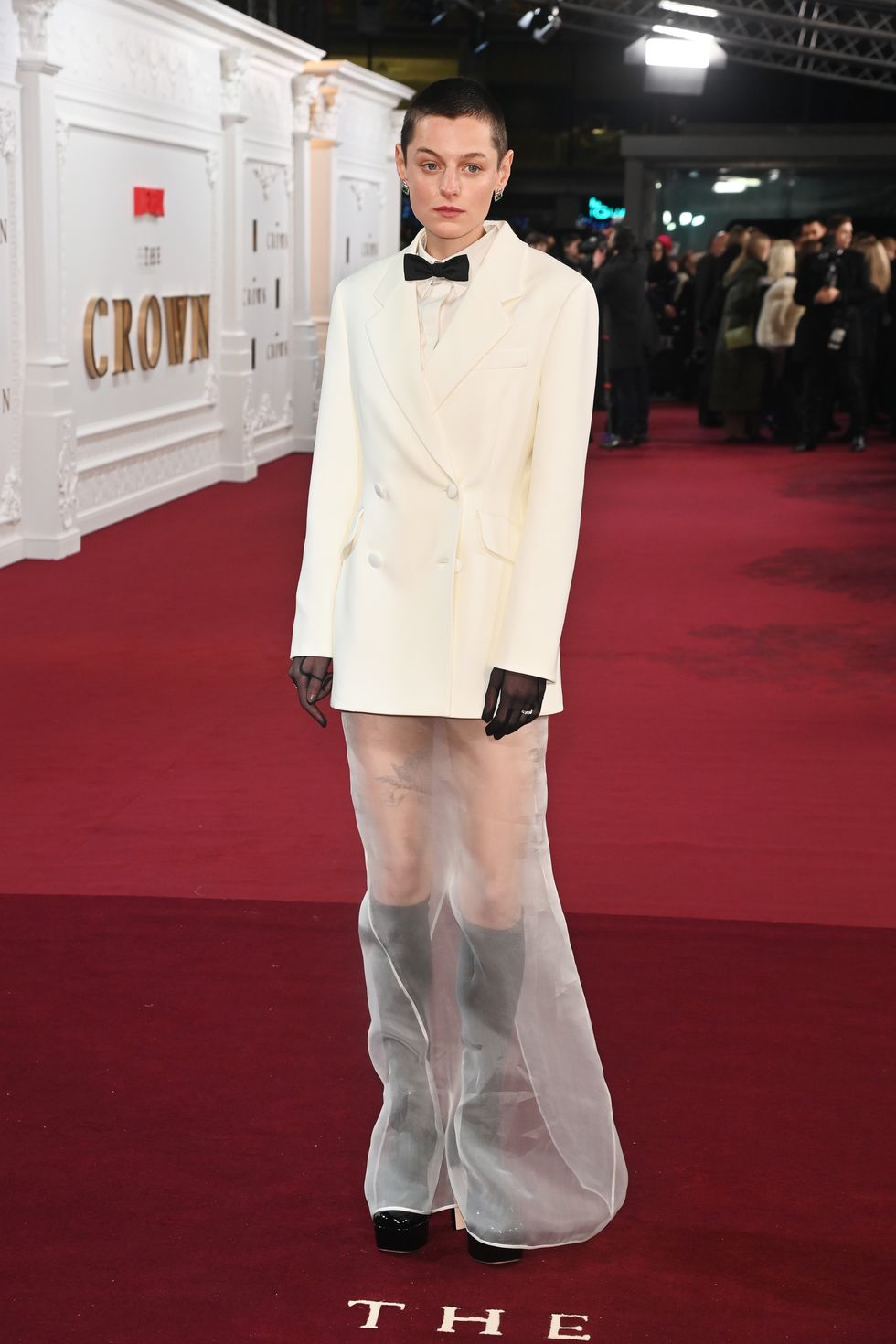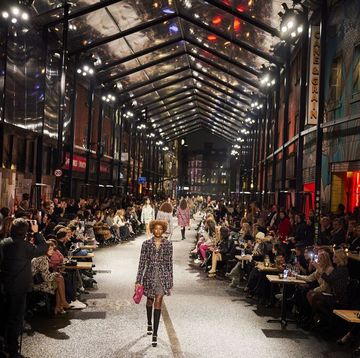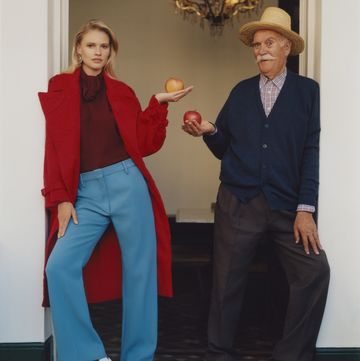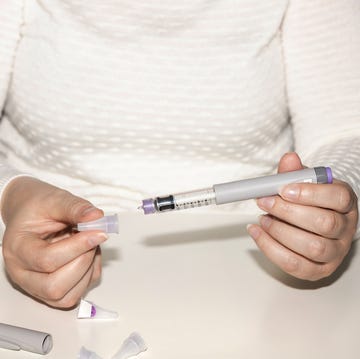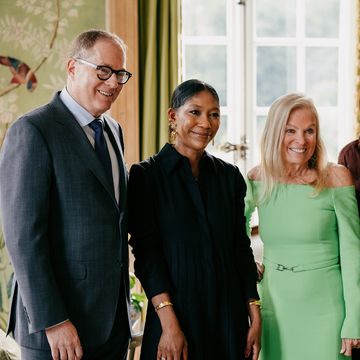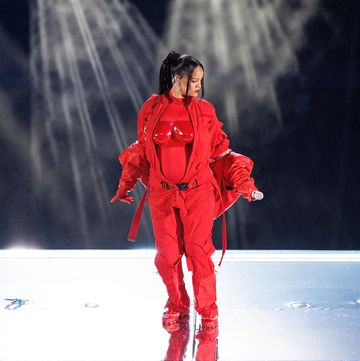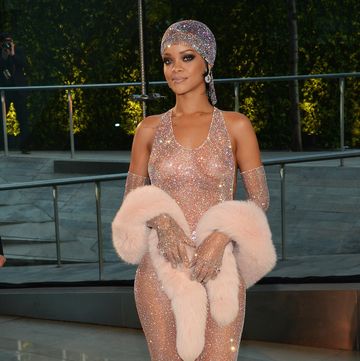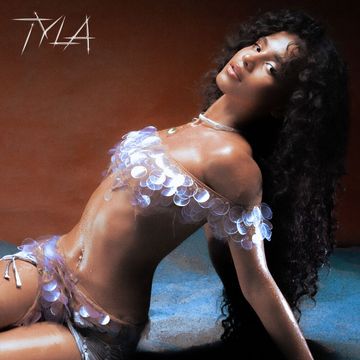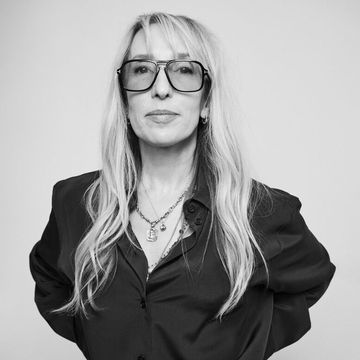Emma Corrin has lost their voice, a string of WhatsApp messages informs me as I inch my way through gridlocked, transit strike-induced traffic towards a north-London studio to meet them for our cover shoot. The actor won’t be able to speak in order to save their voice for the stage later. They’re less than two weeks into what the press have deemed a glorious run as the title character inNeil Barrett’s timely adaption of VirginiaWoolf’s Orlando, the literary classic about a man who wakes up as a woman.
When I get to the studio, I find Corrin, smiling and affable, if unwell, tucked away in a dressing room as a hairstylist tousles their shock of cropped blonde hair and a swirl of people (agent, stylist, photographer, assistants, ELLE team, security guards) quietly whirrs.
‘That was terrifying. And one of those moments where you think, God, I really wish I went to drama school so that I’d know how to preserve my voice, which I just don’t,’ Corrin, dressed in a beanie and striped Bode knit, explains several days later from their London flat when they’ve got some semblance of a voice back. ‘I’m still trying to shake this cough,’ they say, gingerly. Their dog, Spencer, darts in and out of the room.
‘You just realise how much your voice is your tool. I didn’t speak. I was on vocal rest for three or four days, and then just hoped for the best in the evening,’ they add. Still, they managed to push through.
The voice as tool could be a metaphor for this interview, which takes place in the throes of a social media-powered age, when oversharing is the norm and celebrity sit-downs are mired in questions about how much to reveal, to whom and when.
Corrin is warm, friendly, hard-working, likeable – and with boundaries. (It’s a quality I immediately recognise in myself.) They’re an actor who is no longer on the cusp of stardom, but rather in the thick of it, and has had enough time with fame to have mapped out a way to navigate it. But it’s Corrin’s decision to come out as non-binary in 2021 that most often drives headlines in ways that can be, depending on the media outlet, meaningful or reductive. I get the sense that Corrin is stepping into their power to say only what they choose. One moment, they’re posting their explorations with chest binding on Instagram. Another, they’re publicly rejecting the media’s attempts to tie them to a single narrative. And there have been more than a few.
When Corrin gave an interview to the BBC in November, they questioned the relevance of gendered-awards show categories. ‘It’s difficult for me at the moment trying to justify in my head being non-binary and being nominated in female categories. When it comes to categories, do we need to make it specific as to whether you’re being nominated for a female role or a male role?’ The soundbite became the head-line, which travelled across the DailyMail, ITV, CNN and more. Corrin bristled. ‘...if you are interviewing me about my work and the subject of gender comes up, please respect and represent the integrity of my answer in the context of the interview as a whole,’ they wrote in a caption on Instagram. ‘What I mean is, do not sensationalise an answer for the sake of a clickbait headline when it is really a subject that, to be a headline, requires proper enquiry and should be represented with more nuance.’
This incident makes me think of the author and academic Audre Lorde’s words: ‘If I didn’t define myself for myself, I would be crunched into other people’s fantasies for me and eaten alive.’ And while Lorde was speaking to her own experience as a ‘Black lesbian mother in an interracial marriage’ in the 1960s, the message resonates just as much now when considering the ways in which public figures from marginalised back-grounds (women, people of colour, queer, trans, non-binary, disabled or the inter-section of many of those things) navigate sharing the fullness of who they are.
Corrin describes the experience of making Orlando as an opportunity to tell the kind of story they wished were more commonplace. ‘Michael Grandage, the director, spoke a lot about how it was on the syllabus when he was at school. And I would love it if it was back on our school syllabuses. I think it’s such a brilliant book that teaches you so much about identity and love – all these fundamental questions that we ask ourselves,’ they explain. They say the stage adaptation is ‘very much a celebration of theatre as well as a celebration of queer joy and love and all of these other things’.
Before they were famous, Corrin lived in Kent, the child of Chris and Juliette Corrin, a businessman and speech therapist. They developed an interest in acting while at boarding school in Surrey, eventually studying drama at the University of Bristol and later St John’s College, Cambridge. ‘Theatre is where I started,’ they say. In a way, their time in Orlando feels like a homecoming.
Corrin credits the people in their life– a tight-knit circle of longstanding friends and newish, but loyal, work collaborators – with helping them make sense of this new chapter. ‘I think the people in these experiences really make it. It doesn’t matter how brilliant the writing is, it doesn’t matter how brilliant the director is. If you don’t have each other, if you don’t have a sense of community, it can be hard. You really feel supported by people, like they have each other’s backs. And that’s a beautiful thing,’ they say. There’s Corrin’s long-time agent, Maya Hambro. ‘I was her first client at her old agency, and we’ve grown up together. We’re like sisters. You really feel like you’re rising with people. And I think when you have that connection, with projects and roles and stuff, there’s like an invisible dialogue. It’s a deep sense of knowing each other, which is really helpful.’
Corrin’s career exploded when they portrayed Princess Diana in the enormously successful Netflix drama, The Crown, a role that earned them a GoldenGlobe award and Emmy nomination. Corrin then took on a series of critically acclaimed parts spanning buzzy, period pieces on screen and stage, such as My Policeman, Lady Chatterley’s Lover and Orlando. A close friendship with stylist Harry Lambert, who helped craft a cool, audacious, intelligent look for Corrin, sealed the actor’s status as a beloved red-carpet standout and fashion rebel (with Cartier and Miu Miu contracts to prove it) – a tabloid obsession and one of Britain’s most bankable new stars. ‘Harry and I go way back – we’re really good friends. Everything that we collaborate on is always very authentically me because he knows me. He’s always wanting to advocate for young British designers, which we have a lot of fun with,’ they say. Corrin has been wearing a lot of Stefan Cooke and SS Daley lately and describes the designer Harris Reed as a close friend. ‘Wearing people who are homegrown, there’s a real power in that.’
During our chat, Corrin describes a recurring attraction to work and people that provide a sense of security and equilibrium. ‘I need to feel safe. And I need to feel connected to the people who I’m talking to or working with every day.’ Corrin met Grandage while filming My Policeman. ‘We have a wonderful friendship. So the rehearsal process was brilliant.’ Meanwhile, they’ve lived with the same three flatmates for five years, in a building right next door to their best friend, Avigail Tlalim.
While in lockdown, Corrin wrote a screenplay with Tlalim that is now in development. ‘It’s very sweet. We see each other all the time,’ Corrin says of their relationship with their friends. ‘It’s the most grounding thing. It’s all very wholesome. We even had a Pukka advent calendar where we got a teabag everyday. Everyone who walked into the flat said, “That’s so on-brand for you guys.”’
As they ease into a new year, Corrin has been thinking about how to create more time for the relationships that matter most, and we commiserate about how pressured our workdays can feel, post-Covid. ‘It’s my New Year’s resolution to be more in touch with my two brothers because we’re all quite bad at communicating. I just don’t see them. It’s been seven months,’ they say, after admitting that they only had two days off from work during the Christmas holiday.
‘I’d love to get better at carving out space and time for myself. Even just yesterday, I didn’t have shoots or meetings and stuff. I took my dog for a really long walk, for like an hour and a half. It was like, “Wow, I haven’t done this.”’
This interview appears in the March issue of ELLE UK out now.
'Lady Chatterley’s Lover' is currently stream-ing on Netflix. 'Orlando' runs at the Garrick until February 23. Corrin will also star in 'The Retreat' later this year.
PHOTOGRAPHS BY RUTH OSSAI; STYLING BY BEN SCHOFIELD
